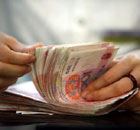-
-
China Daily E-paper
World
No need to sanction Iran
By M D Nalapat ( chinadaily.com.cn)
Updated: 2010-05-04 09:20
 |
Large Medium Small |
The United States is seeking fresh sanctions against Iran.
However, despite the US-led sanctions on technology and finance that have been in place against Iran since 1979 -- when the US embassy in Teheran was seized by mobs -- that country remains the most important domestic player in the Middle East, together with Saudi Arabia.
| ||||
Apart from gaining momentum toward putting in place a global fissile material cutoff treaty (FMCT), US President Barack Obama hopes that he would get the support of China and Russia for his policy of much tougher sanctions on Iran, a policy that France, Germany and the UK fully back.
The Obama administration expects that fresh sanctions would further hurt Iran's economy, and thereby make the government in Teheran less popular with the people. Also, tougher sanctions that are UN-approved would give a better international legal cover, should it be decided later to use military methods against Iran, the way the Bush administration planned to do till it got derailed by economic turmoil in the closing months of 2007.
The stand of India on sanctions against Iran was made clear by Prime Minister Singh in Washington, that they hurt only the common people and are therefore not desirable. The sanctions on Iraq in the 1990s had no effect on the top people there, but condemned several hundreds of thousands of children to death, because of deteriorating health and nutrition. To replicate such folly in Iran would be to do an immense injustice to the people of Iran, who share a history of thousands of years of civilization with India and China.
There is no doubt of the need to ensure that nuclear materials do not fall into the hands of terrorists -- the stated aim of the Washington Nuclear Security Summit last month. There is need to ensure swift exposure and punishment of all individuals found responsible for allowing such elements to gain access to such materials.
However, prevention of nuclear terrorism ought not to be made an excuse for the creation of a regime of technology denial that would condemn hundreds of millions to even greater suffering. Above all, a new international order should be based on justice and fair play, not on "might being right", which is the basis of the international institutions created after World War II.
It is exactly such a basis that has led some countries to substitute force for reason, to invade and occupy countries, and to enforce sanctions that destroy millions of lives and countless more futures.
The major countries and blocs of the planet -- the US, China, the EU and India -- need to work together to put in place a system that gets over the blockade of alternative technologies created by fossil fuel lobbies. The Obama administration needs to walk away from the Clinton-era division of the world into "us" and "them", and instead accept "we", the entire human race, as equally deserving of the opportunities for progress that access to nuclear energy can bring.












